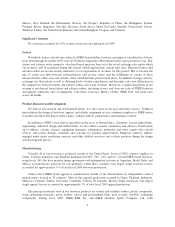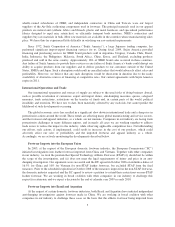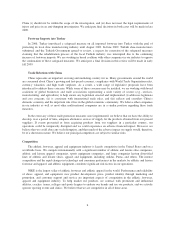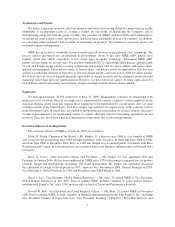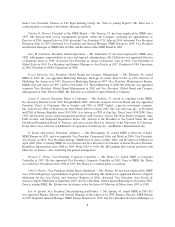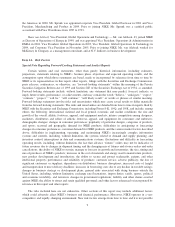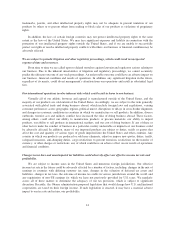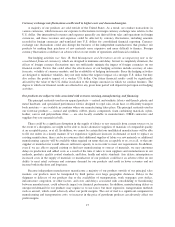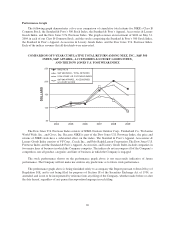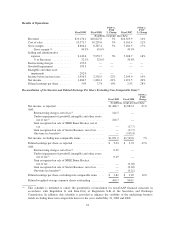Nike 2009 Annual Report Download - page 16
Download and view the complete annual report
Please find page 16 of the 2009 Nike annual report below. You can navigate through the pages in the report by either clicking on the pages listed below, or by using the keyword search tool below to find specific information within the annual report.trademarks, patents, and other intellectual property rights may not be adequate to prevent imitation of our
products by others or to prevent others from seeking to block sales of our products as violations of proprietary
rights.
In addition, the laws of certain foreign countries may not protect intellectual property rights to the same
extent as the laws of the United States. We may face significant expenses and liability in connection with the
protection of our intellectual property rights outside the United States, and if we are unable to successfully
protect our rights or resolve intellectual property conflicts with others, our business or financial condition may be
adversely affected.
We are subject to periodic litigation and other regulatory proceedings, which could result in unexpected
expense of time and resources.
From time to time we are called upon to defend ourselves against lawsuits and regulatory actions relating to
our business. Due to the inherent uncertainties of litigation and regulatory proceedings, we cannot accurately
predict the ultimate outcome of any such proceedings. An unfavorable outcome could have an adverse impact on
our business, financial condition and results of operations. In addition, any significant litigation in the future,
regardless of its merits, could divert management’s attention from our operations and result in substantial legal
fees.
Our international operations involve inherent risks which could result in harm to our business.
Virtually all of our athletic footwear and apparel is manufactured outside of the United States, and the
majority of our products are sold outside of the United States. Accordingly, we are subject to the risks generally
associated with global trade and doing business abroad, which include foreign laws and regulations, varying
consumer preferences across geographic regions, political unrest, disruptions or delays in cross-border shipments
and changes in economic conditions in countries in which we manufacture or sell products. In addition, disease
outbreaks, terrorist acts and military conflict have increased the risks of doing business abroad. These factors,
among others, could affect our ability to manufacture products or procure materials, our ability to import
products, our ability to sell products in international markets, and our cost of doing business. If any of these or
other factors make the conduct of business in a particular country undesirable or impractical, our business could
be adversely affected. In addition, many of our imported products are subject to duties, tariffs or quotas that
affect the cost and quantity of various types of goods imported into the United States and other countries. Any
country in which our products are produced or sold may eliminate, adjust or impose new quotas, duties, tariffs,
safeguard measures, anti-dumping duties, cargo restrictions to prevent terrorism, restrictions on the transfer of
currency, or other charges or restrictions, any of which could have an adverse effect on our results of operations
and financial condition.
Changes in tax laws and unanticipated tax liabilities could adversely affect our effective income tax rate and
profitability.
We are subject to income taxes in the United States and numerous foreign jurisdictions. Our effective
income tax rate in the future could be adversely affected by a number of factors, including: changes in the mix of
earnings in countries with differing statutory tax rates, changes in the valuation of deferred tax assets and
liabilities, changes in tax laws, the outcome of income tax audits in various jurisdictions around the world, and
any repatriation of non-US earnings for which we have not previously provided for U.S. taxes. We regularly
assess all of these matters to determine the adequacy of our tax provision, which is subject to significant
discretion. Recently, the Obama administration proposed legislation that would change how U.S. multinational
corporations are taxed on their foreign income. If such legislation is enacted, it may have a material adverse
impact to our tax rate and in turn, our profitability.
14


